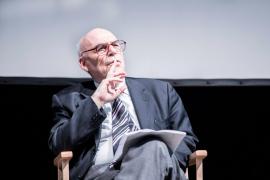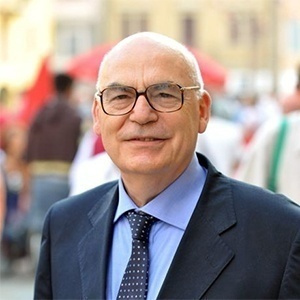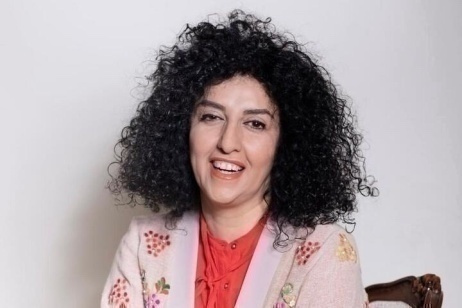
Following we publish the remarks by philosopher Salvatore Natoli during the last lecture in conference series “The crisis of Europe and the Righteous of our time ", held on 18 May at the Franco Parenti Theatre.
Thank you for inviting me to the presentation of this Charter, which is a “table of values” but even more an “indication of duties”. It is clear in facts that, as a consequence of what we have said about freedom, values have to be defined anew over time, within different contexts and during emergencies. It is clear that some things exist, which transcend mere chance: we are historical subjects, above all as individuals, and it is in the different moments and contexts that we must bring about the force of values. Therefore we say the Charter is the opening to an unlimited duty, and as such, can be extended and have additions made to it.
I am also grateful to everybody for being here, as I have been here more or less since the beginning. I am very happy to have witnessed the very beginnings of Gariwo’s endeavor, and the fact that it has grown, it has increased its activity and importance, and found a great consensus, is already a sign of the fertility of Good.
I would like to highlight some focal points for discussion about this Charter. The key of this document is Responsibility: responsibility that can be considered in two fundamental ways. First of all the compliance with a given duty (or said otherwise, you are responsible because you have been assigned a duty and you must accomplish it), because the assignment of a duty essentially means that you find yourself in front of people who nurture expectations of you, and if you do not perform your duty well you are going to dash their expectations. As a consequence, the first way of being a Righteous is the most ordinary one: do what you have to do where you are, which is the Jewish notion of Righteousness.
The preliminary kind of Righteous man is therefore the observant, i.e. the man who follows the precepts. And precepts, unless they are arbitrary – and they are never, because they stabilize over time – are the duties that everyone must accomplish to meet the others’ expectations. Here is how from this point of view, the first kind of responsibility is doing our duty well. The measure by which people do well is thus the satisfaction they ensure their users or the capability to adequately satisfy the others’ needs.
On the contrary, the first deviation from responsibility, which is also the most ordinary and widespread one, is not doing one’s duty well. The first question we need to ask ourselves is: “But are we doing well what we are supposed to do? Are we accomplishing our duty?Are we betraying the others’ expectations or are we instead meeting them?”. The first kind of injustice is to disappoint expectations, which equals to breaking a bond. This is the first stage, the most personal and intimate one.
Then there is a deeper level of responsibility, which does not deal with the respect or compliance with our duty, but with the response to a need, which is even unexpressed.
We all are bringers of needs. In this case the dimension of responsibility is therefore not embodied in doing what we must do, but in listening to the others’ needs, feeling responsible for the others’ life. And this is the first real form of feeling of reciprocal obligation. Responsibility is not about doing what I must, but rather about recognizing the others’ voice, in that we all are bringers of needs. Not only that, but many times we are not even perfectly aware of what we want and it is the other who enables us to understand it, revealing us to ourselves. We are a bundle of wishes, needs, impulses, and it is in our relation with the other that we have a criterion of truth, because it is in the relation and interaction with the other that impulse and desire are turned into words, becoming discourse.
This is dialogue. There is dialogue if you set yourself to listen to the other. Dialogue is difficult, because the inner attitude of dialoguer – when he starts dialoguing with another – is the idea that in the end he might end up changing his mind radically. Dialogue thus presupposes the attitude of awareness of one’s on radical change of mind and even of ourselves, because from the other, through dialogue, comes the opportunity to reaffirm one’s vision. If all this falls short, dialogue is impossible, and we are in the presence of a rhetoric of dialogue, in which people don’t talk to each other, but entertain each other.
The worst damages were done by people who fought for the truth, immolating themselves, murdering others and committing suicide for the truth. An example of this are the kamikazes. We therefore understand that the road to the truth goes through its interrogation - skepsis. Then we can find glimpses of truth, just for some moments, time lapses, and through cuts. Talking with Gabriele Nissim, I quoted the movie Silence, by Scorsese, in which the Jesuit who has arrived in those lands for his evangelizing mission, in the end, when confronted with the torture that is imposed to the converts, says: “God cannot want this, therefore it is better to abjurate than believe in something that bears as a consequence this destruction of man”.
Coming to talk about the second issue, who is thus the Righteous?I would start with a statement that I would define as of tragic optimism – also because I believe optimism is either tragedy or stupidity, because we cannot be optimistic in the face of horror. In what does tragic optimism consist? It consists in a reasoning by absentia. In the face of what we see in the world, we read in the newspapers, we are in a continuous war; there is an endless cruelty, there are hundreds of thousands of deads every day, not to mention those who die of hunger. If you think of it, you are going to lose your breath. And the key question is the one that the cabalists used to ask themselves: “How can the world stand in the face of this horror, why did it not collapse, why has it not unmade itself, yet?”.
The answer is that there are the Righteous, although we do not know who they are, and we will never know. And the Righteous we know, as Gabriele pointed out, are those whom we come across after the events or by chance. I will tell you more: we cannot even say they are Righteous men in the absolute sense of the term, that they have always done just deeds. If we look at their biographies, in fact, we often notice that these individuals have ambiguous stories, which are everything but adamant. Despite this, in the face of extreme Evil they have performed an act, which on that particular moment opened a dimension of truth.
In facts the characteristic of the Righteous is his being a deviant, not because they have any intention of deviating, as a planned act. They are rather Righteous because, despite the presence of a conduct which is deemed as obvious, beyond a certain limit they feel instinctively that it is impossible to go further.
Everybody were fascists in the collective behavior, and those who were not could not even say it – there were only a few opponents, and then there were relatively indifferent people under that regime, which as a whole adapted themselves, were not political opponents. Nonetheless, when those people saw the first signs of persecution against the Jews, they did not hesitate to deviate from the widespread behavior and they committed themselves to rescuing the Jews.
So the Righteous perceive something is going beyond the limits, and realize it when the others do not see it yet; it is in this sense that they are inaugurating, and exemplary. We have rediscovered some of them, but probably many Righteous who have saved and helped the persecuted, are still unknown.
The Righteous are not those who set themselves as a goal to, but those who act for good without ever showing it off, and this must motivate us as individuals. We must do good not to make it known, but we must do good for the sake of good itself. In a world, which is all focused on vanity, the dimension of appearance prevails on the humility of acting. Over the Internet you see the steady exhibition of yourself, and you lie about yourself, too; you can even simulate pain to draw the people’s attention, to awaken pity.
The Net is not the place of truth, but it is rather the most perfect place for telling lies, as there is no cruel skepsis that asks and interrogates in it.
Therefore we need a cognitive revolution. We need it at schools – “teaching to think” and not “learning things”… like Socrates had taught, we should start learning by dilemmas, and not by assertions.
This shall educate to public debate, which proceeds by dilemmas, by confronting arguments, otherwise it is no debate. Why thus do we lack a public debate? Because we have a competitive struggle, which targets the emotions in order to win. To win you shall tickle the worst attitudes of people, you must enter their wishes, their belly, in order to entice them. As a consequence, it is not necessary to produce arguments, but it suffices to work on strong and elementary feelings such as desire, anger, fear, lust. It is a bit utopian, hard to realize, instead, a public debate that has the terseness, and the timing, of reasoning.
You can well see that al this becomes practical, daily; teachers must do so every day, these thoughts must enter our daily lives.
This because the Righteous, when we discover some – and therefore rarely – are those who persevere constantly over time for the sake of good, feeling, regarding it, as constantly inadequate.
We shall start from these remarks to make sure that what is a Charter can become life, in the ordinary rhythm of our existence.






